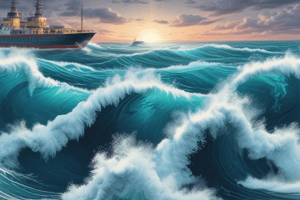Podcast
Questions and Answers
Where does deep water typically begin?
Where does deep water typically begin?
- In the polar regions
- Above the thermocline
- At the surface level
- Below the thermocline (correct)
What is the primary factor that causes cold water to sink and flow towards the equator?
What is the primary factor that causes cold water to sink and flow towards the equator?
- Warmer temperatures
- Increased salinity
- Higher pressure
- Decreased density (correct)
Which oceanic region is the main source of deep water?
Which oceanic region is the main source of deep water?
- Equatorial regions
- Tropical regions
- Mid-latitude regions
- Polar regions (correct)
What separates warmer surface waters from colder, deeper layers in the ocean?
What separates warmer surface waters from colder, deeper layers in the ocean?
Why do many organisms in deep water have symbiotic relationships?
Why do many organisms in deep water have symbiotic relationships?
What geological feature is associated with giant tube worms in deep water ecosystems?
What geological feature is associated with giant tube worms in deep water ecosystems?
What is a key geological feature found in deep water?
What is a key geological feature found in deep water?
What human activity has led to impacts on deep water ecosystems?
What human activity has led to impacts on deep water ecosystems?
Which tool is NOT mentioned as a technological advancement for exploring the deep sea?
Which tool is NOT mentioned as a technological advancement for exploring the deep sea?
What is a major impact of climate change on the deep sea?
What is a major impact of climate change on the deep sea?
In which part of the ocean are the deepest points located?
In which part of the ocean are the deepest points located?
What has enabled scientists to conduct research in the deep sea without risking human lives?
What has enabled scientists to conduct research in the deep sea without risking human lives?
Flashcards are hidden until you start studying
Study Notes
Exploring the Depths: Understanding Deep Water
Deep water is a captivating realm beneath our oceans, a world of immense depths and incredible pressure. This expansive environment hosts diverse ecosystems, fascinating geological features, and countless mysteries still waiting to be discovered.
Defining Deep Water
Deep water, in a general context, refers to the part of the ocean that lies below the thermocline. The thermocline is the region where temperature sharply decreases as one descends, separating warmer surface waters from the colder, deeper layers. As a result, the depth at which deep water begins varies depending on location and season, typically beginning at around 200 meters (660 feet).
Dynamics of Deep Water
The majority of deep water originates from the polar regions. As cold water sinks due to its higher density, it flows towards the equator, where it mixes with warmer currents, forming a global conveyor belt of ocean circulation. This process, known as thermohaline circulation, has a profound impact on the Earth's climate and weather patterns.
The Role of Deep Water in Ocean Life
Deep water is home to a diverse array of organisms, many of which are unique to these environments. Some adapted to the extreme conditions by developing symbiotic relationships with other species, like the giant tube worms that reside around underwater hydrothermal vents. Others, like the deep-sea anglerfish, have evolved specialized hunting techniques to stalk prey in the pitch-black depths.
Deep-Sea Geological Features
Deep water also boasts a wealth of geological features, such as underwater mountains called seamounts. These volcanic structures often provide valuable habitats for marine life, and some have been found to harbor unique species not found anywhere else in the world. Additionally, the trenches, or hadal zones, are the deepest points in the ocean, reaching depths of over 11,000 meters (36,000 feet). These harsh, inhospitable environments are the final frontier of ocean exploration and still hold many undiscovered secrets.
Human Impacts on Deep Water
Unfortunately, human activities have led to numerous impacts on deep water ecosystems, such as overfishing, pollution, and depletion of oxygen levels. Climate change, primarily through rising ocean temperatures and acidification, is also causing the deep sea to warm and become less habitable for many marine species.
The Future of Deep Water Exploration
As technology continues to advance, so too does our ability to explore and understand deep water environments. With new tools like autonomous underwater vehicles (AUVs), remotely operated vehicles (ROVs), and deep-sea submersibles, scientists are increasingly able to conduct research in the deep sea without putting human lives at risk. As a result, our knowledge of deep water ecosystems is constantly expanding, and many more mysteries will likely be revealed in the years to come.
In summary, deep water is a complex and fascinating realm of our planet, home to diverse ecosystems, geological features, and countless mysteries waiting to be discovered. As technology continues to advance and our understanding of these environments increases, we can work towards protecting deep water ecosystems and ensuring the health of our planet.
Studying That Suits You
Use AI to generate personalized quizzes and flashcards to suit your learning preferences.



